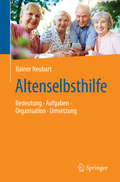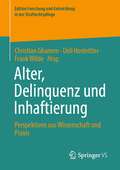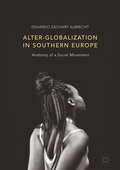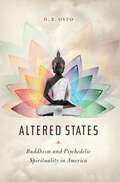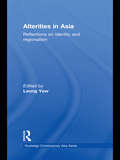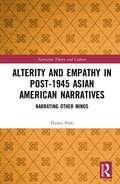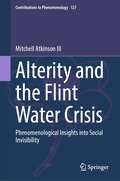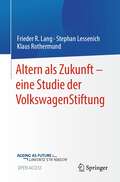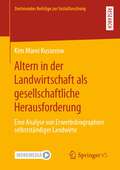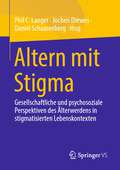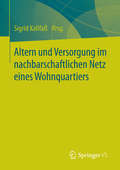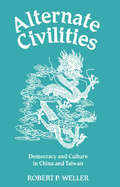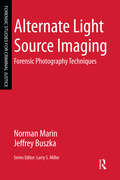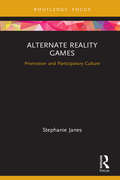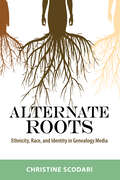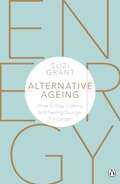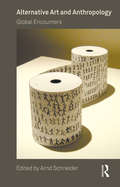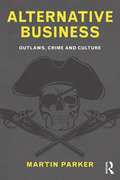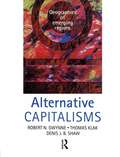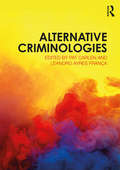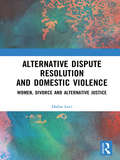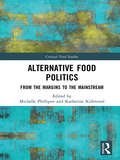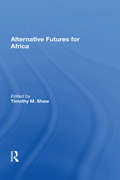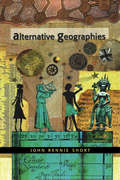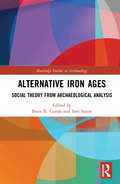- Table View
- List View
Altenselbsthilfe: Bedeutung - Aufgaben - Organisation - Umsetzung
by Rainer NeubartDas vorliegende Werk beschreibt Bedeutung, Aufgaben, Organisation und Umsetzung der Altenselbsthilfe in Deutschland. Es wendet sich an politische Institutionen, Entscheider im Sozialmanagement, z. B. Kommunalstellen sowie an alle Bereiche, die mit Altenarbeit zu tun haben, wie Case-Manager, Pflegest#65533;tzpunkte, Krankenkassen, aber auch an Sozialwissenschaftler, Sozialarbeiter, Selbsthilfegruppen und Senioren. Dr. Rainer Neubart, ausgewiesener Experte auf dem Gebiet der Altersmedizin, beschreibt anschaulich, einf#65533;hlsam und sehr praxisnah, wie es gelingt, mit der Ressource ,,#65533;lterer Mensch" dem Hilfebedarf anderer #65533;lterer Menschen zu begegnen. Altenselbsthilfe kann dabei die gravierende Versorgungsl#65533;cke schlie#65533;en, die aufgrund des demographischen Wandels entstehen wird und damit eine ,,Win-Win-Win"-Situation f#65533;r alle Beteiligten darstellen - f#65533;r die Helfer, f#65533;r diejenigen, denen geholfen wird und f#65533;r die Gesellschaft.
Alter, Delinquenz und Inhaftierung: Perspektiven aus Wissenschaft und Praxis (Edition Forschung und Entwicklung in der Strafrechtspflege)
by Frank Wilde Christian Ghanem Ueli HostettlerIm Straf- und Maßregelvollzug leben zunehmend lebensältere Menschen. Dies bringt für die Gesellschaft, die Institutionen des Vollzugs und deren Personal aber insbesondere für die Inhaftierten selbst spezifische Herausforderungen mit sich. Pflege unter Bedingungen des Zwangs, Entlassperspektiven oder die Begleitung von Sterbeprozessen sind nur einige Beispiele für die Themen, die in diesem Sammelband zusammengefasst werden. Dabei wird nicht nur Raum gegeben für empirische Studien insbesondere aus dem Bereich der Adressat:innenforschung und für wissenschaftliche Erklärungsversuche von Delinquenz im Alter. Auch Praktiker:innen kommen zu Wort, um die vielfältigen Perspektiven auf die Themen von älteren Gefangenen zusammenzuführen und Impulse für effektive und menschenwürdige (Be-)Handlungsansätze zu liefern.
Alter-globalization in Southern Europe: Anatomy of a Social Movement
by Eduardo Zachary AlbrechtConsidering the rise of global political instability and subsequent importance of new social movements, this cutting edge book examines the relationship between the alter-globalization movement and political power in Italy, Spain, and Greece. It argues that not only is the movement anti-political, but that it operates within an apolitical social milieu, as a ritualized holding pattern for middle class youths that find themselves uncomfortably placed between a receding state structure on the one hand, and a rising informal economy on the other. Its ritual liminality allows adherents to act revolutionary while assuring that their middle class privileges remain intact. The author considers the social ramifications of the movement at a time when Europe finds itself at a political and economic crossroads, and offers specific and timely case studies from the three southern European countries.
Altered States: Buddhism and Psychedelic Spirituality in America
by Douglas OstoIn the 1960s, Americans combined psychedelics with Buddhist meditation to achieve direct experience through altered states of consciousness. As some practitioners became more committed to Buddhism, they abandoned the use of psychedelics in favor of stricter mental discipline, but others carried on with the experiment, advancing a fascinating alchemy called psychedelic Buddhism. Many think exploration with psychedelics in Buddhism faded with the revolutionary spirit of the sixties, but the underground practice has evolved into a brand of religiosity as eclectic and challenging as the era that created it. <P><P>Altered States combines interviews with well-known figures in American Buddhism and psychedelic spirituality—including Lama Surya Das, Erik Davis, Geoffrey Shugen Arnold Sensei, Rick Strassman, and Charles Tart—and personal stories of everyday practitioners to define a distinctly American religious phenomenon. The nuanced perspective that emerges, grounded in a detailed history of psychedelic religious experience, adds critical depth to debates over the controlled use of psychedelics and drug-induced mysticism. The book also opens new paths of inquiry into such issues as re-enchantment, the limits of rationality, the biochemical and psychosocial basis of altered states of consciousness, and the nature of subjectivity.
Alterities in Asia: Reflections on Identity and Regionalism (Routledge Contemporary Asia Series)
by Leong YewThis book investigates the politics of identity in Asia and explores how different groups of people inside and outside Asia have attempted to relate to the alterity of the places and cultures in the region through various modes (literary and filmic representation, scholarly knowledge, and so on) and at different points in time. Although coming from different perspectives like literary criticism, film studies, geography, cultural history, and political science, the contributors collectively argue that Asian otherness is more than the dialectical interplay between the Western self and one of its many others, and more than just the Orientalist discourse writ large. Rather, they demonstrate the existence of multiple levels of inter-Asian and intercultural contact and consciousness that both subvert as much as they consolidate the dominant ‘Western Core-Asian periphery’ framework that structures what the mainstream assumes to be knowledge of Asia. With chapters covering a wealth of topics from Korea and its Cold War history, to Australia's Asian identity crisis, this book will be of huge interest to anyone interested in critical Asian studies, Asian ethnicity, postcolonialism and Asia cultural studies. Leong Yew is an Assistant Professor in the University Scholars Programme, National University of Singapore. He is the author of The Disjunctive Empire of International Relations (2003).
Alterity and Empathy in Post-1945 Asian American Narratives: Narrating Other Minds (Narrative Theory and Culture)
by Hyesu ParkThis book examines how Asian American authors since 1945 have deployed the stereotype of Asian American inscrutability in order to re-examine and debunk the stereotype in various ways. By paying special attention to what narrative theorists have regarded as one of the most extraordinary aspects of fiction—its ability to give (or else deny) readers a remarkably detailed knowledge of the inner lives of their characters—this book explores deeply and systematically the specific ways Asian American narratives attribute inscrutable minds to Asian American characters, situating them at various points along a spectrum stretching between alterity and empathy. Ultimately, the book reveals the link between narrative form and larger cultural issues associated with the representation of Asian American minds, and how a nuanced investigation of narrative form can yield insights into the sociocultural embeddedness of Asian American literature under the case studies—insights that would not be available if such formal questions were by passed.
Alterity and the Flint Water Crisis: Phenomenological Insights into Social Invisibility (Contributions to Phenomenology #127)
by Mitchell Atkinson IIIThis text develops a novel methodology for social investigation into the Flint (Michigan, USA) water crisis by using classical Husserlian phenomenology as its point of departure. To develop a proper method in a case like this, the author uses as primary data the experiences of the affected community. The text investigates philosophically how a water crisis happens as well as the structures of power responsible. This book grounds contemporary theories of power in a phenomenology of social experience. Key to that grounding is the careful elaboration of subject positions in power structures as partially constitutive of lifeworlds (lebensumwelten) for consciousness. The applied phenomenological tools unravel the central enigma of how a community’s concerns and the dictates of power can become so disastrously estranged. This text appeals to researchers and students working not just in phenomenology and philosophy but also to those working in the field of environmental humanities and on social justice issues.
Altern als Zukunft – eine Studie der VolkswagenStiftung
by Stephan Lessenich Frieder R. Lang Klaus RothermundDeutschland altert – aber was heißt das? Ist das schlimm? Und kann eine Gesellschaft überhaupt als Ganzes altern? In einer Zusammenführung von psychologischen, gerontologischen und soziologischen Erkenntnissen eröffnet dieses Open Access Buch einen bislang einzigartigen, vielseitigen und realistischen Blick auf das Phänomen des Alters und den Prozess des Alterns. Schwerpunkte des Projekts Altern als Zukunft waren Forschungen zu Altersbildern, zur Vorsorge für das Alter sowie zum Zeithandeln im Alter. Über ein Jahrzehnt lang führten die Autoren hierzu quantitative und qualitative Untersuchungen in drei Kontinenten durch. Die Ergebnisse zeigen, dass vereinseitigende Sichtweisen auf das Alter – seien es negative Stereotypen oder positive Überhöhungen – der Komplexität von Alternserfahrungen nicht gerecht werden. Das Buch richtet sich an alle, die sich für das Altern interessieren: wissenschaftlich, gesellschaftspolitisch, praktisch und persönlich. Ob alt oder jung, das Buch regt dazu an, eigene Sichtweisen zu hinterfragen. Eines wird deutlich: das ‚eine‘ Alter gibt es nicht – und Altern ist unsere Zukunft. Altern als Zukunft plädiert für die individuelle wie gesellschaftliche Akzeptanz der sozialen Tatsache des Alterns – und für das Recht, im höheren Alter genauso selbstbestimmt leben zu können wie in anderen Altersphasen auch.
Altern in der Landwirtschaft als gesellschaftliche Herausforderung: Eine Analyse von Erwerbsbiographien selbstständiger Landwirte (Dortmunder Beiträge zur Sozialforschung)
by Kim Marei KusserowSeit Jahrzehnten befindet sich die Landwirtschaft in einem Strukturwandel, der mit zahlreichen Entwicklungen einhergeht. Neben einer veränderten Arbeitsstruktur und -organisation nimmt der Strukturwandel auch Einfluss auf die (Erwerbs-)Biographien der Menschen, die in der Landwirtschaft arbeiten. Auf Grundlage qualitativer Interviews mit Betriebsleiter*innen aus Niedersachsen sowie Vertreter*innen landwirtschaftlicher Organisationen befasst sich das vorliegende Buch mit den aktuellen und zukünftigen Rahmenbedingungen für die Lebensgestaltung im höheren Alter von selbstständigen Landwirt*innen und analysiert diese vor dem Hintergrund biographietheoretischer Konzepte.
Altern mit Stigma: Gesellschaftliche und psychosoziale Perspektiven des Älterwerdens in stigmatisierten Lebenskontexten
by Phil C. Langer Jochen Drewes Daniel SchaarenbergErstmals im deutschsprachigen Raum wird die Lebenswirklichkeit von Menschen, deren Älterwerden mit gesundheitlichen und gesellschaftlichen Stigmata verbunden ist, systematisch in den Blick genommen. Menschen mit Migrationshintergrund oder Behinderung, mit chronischen Erkrankungen wie HIV/Aids, mit langjähriger Drogen- oder Psychoseerfahrung, schwul, lesbisch oder trans* lebende Menschen weisen im Alter aufgrund ihrer Zugehörigkeit zu einer stigmatisierten Gruppe spezifische psychosoziale Bedarfe auf. In dem Sammelband werden diese Bedarfe anhand aktueller Forschungs- und Praxisbefunde adressiert und innovative Perspektiven eines selbstbestimmten Alterns aufgezeigt.
Altern und Versorgung im nachbarschaftlichen Netz eines Wohnquartiers: Zur Kooperation eines Altenhilfeträgers und einer Wohnbaugenossenschaft bei der quartiersbezogenen Gemeinwesenarbeit
by Sigrid KallfaßDiese Publikation beinhaltet die Ergebnisse des vom Bundesministeriums für Bildung und Forschung geförderten Projekts ,,Altern und Versorgung im nachbarschaftlichen Netz einer Wohnbaugenossenschaft". Die umfassende Studie liefert wichtige Aspekte zur Förderung einer Generationenbeziehung im nachbarschaftlichen Kontext.
Alternate Civilities
by Robert Paul WellerSome Asian political leaders and Western academics have recently claimed that China is unlikely to produce an open political system. This claim rests on the idea that "Confucian culture" provides an alternative to Western civil values, and that China lacked the democratic traditions and even the horizontal institutions of trust that could build a civil society. An opposed school of thought is far more optimistic about democracy, because it sees market economies of the kind China has begun to foster as pushing inexorably against authoritarian political control and reproducing Western patterns of change.Alternate Civilities argues for a different set of political possibilities. By comparing China with Taiwan's new and vibrant democracy, it shows how democracy can grow out of Chinese cultural roots and authoritarian institutions. The business organizations, religious groups, environmental movements, and women's networks it examines do not simply reproduce Western values and institutions. These cases point to the possibility of an alternate civility, neither the stubborn remnant of an ancient authoritarian culture, nor a reflex of market economics. They are instead the active creation of new solutions to the problems of modern life.
Alternate Light Source Imaging: Forensic Photography Techniques
by Norman Marin Jeffrey BuszkaAlternate Light Source Imaging provides a brief guide to digital imaging using reflected infrared and ultraviolet radiation for crime scene photographers. Clear and concise instruction illustrates how to accomplish good photographs in a variety of forensic situations. It demonstrates how tunable wavelength light sources and digital imaging techniques can be used to successfully locate and document physical evidence at the crime scene, in the morgue, or in the laboratory. The scientific principles that make this type of photography possible are described, followed by the basic steps that can be utilized to capture high quality evidentiary photographs.
Alternate Reality Games: Promotion and Participatory Culture (Routledge Critical Advertising Studies)
by Stephanie JanesUsing textual analysis, interviews with game designers, audience surveys, and close analysis of player forum discussion, this book examines the unique nature of the producer/consumer relationship within promotional Alternate Reality Games (ARGs). Historically, ARGs are rooted in advertising as much as they are in narrative storytelling. As designers often have to respond to player actions as the game progresses, players can have an impact on the storyline, on character behaviour, and potentially on the final resolution of the narrative. This book explores how both media consumers and producers are responding to this new reconfiguration of the producer/consumer/prosumer dynamic in order to better understand the diverse advertising experiences available to media audiences today. With a focus on participatory culture and the political economy of promotional communications, this in-depth analysis of ARGs will appeal to academics and researchers in the fields of games, film, advertising, and media and cultural studies.
Alternate Roots: Ethnicity, Race, and Identity in Genealogy Media (Race, Rhetoric, and Media Series)
by Christine ScodariIn recent years, the media has attributed the increasing numbers of people producing family trees to the aging of baby boomers, a sense of mortality, a proliferation of Internet genealogy sites, and a growing pride in ethnicity. A spate of new genealogy-themed television series and Internet-driven genetic ancestry testing services have now emerged, capitIn recent years, the media have attributed the increasing numbers of people producing family trees to the aging of baby boomers, a sense of mortality, a proliferation of Internet genealogy sites, and a growing pride in ethnicity. A spate of new genealogy-themed television series and Internet-driven genetic ancestry testing services have now emerged, capitalizing on the mapping of the human genome in 2003. This genealogical trend poses a need for critical analysis, particularly along lines of race and ethnicity. In contextual ways, as she intersperses an account of her own journey chronicling her Italian and Italian American family history, Christine Scodari lays out how family historians can understand intersections involving race and/or ethnicity and other identities inflecting families. Through engagement in and with genealogical texts and practices, such as the classic television series Roots, Ancestry.com, and Henry Louis Gates’s documentaries, Scodari also explains how to interpret their import to historical and ongoing relations of power beyond the family. Perspectives on hybridity and intersectionality gesture toward making connections not only between and among identities, but also between localized findings and broader contexts that might, given only cursory attention, seem tangential to chronicling a family history. Given current tools, texts, practices, cultural contexts, and technologies, Scodari’s study determines whether a critical genealogy around race, ethnicity, and intersectional identities is viable. She delves into the implications of adoption, orientation, and migration while also investigating her own genealogy, examining the racial, ethnic experiences of her forebears and positioning them within larger, cross-cultural contexts.There is little research on genealogical media in relation to race and ethnicity. Thus, Scodari blends cultural studies, critical media studies, and her own genealogy as a critical pursuit to interrogate issues bound up in the nuts-and-bolts of engaging in family history.alizing on the mapping of the human genome in 2003. This genealogical trend poses a need for critical analysis, particularly along lines of race and ethnicity.In contextual ways, Christine Scodari lays out how family historians can understand intersections involving race and/or ethnicity within families. Through engagement in and with genealogical texts and practices, such as the classic television series Roots, Ancestry.com, and Henry Louis Gates’ documentaries, Scodari also explains how to decipher their import to historical and ongoing relations of power beyond the family. Perspectives on hybridity and intersectionality gesture toward making connections not only between and among identities, but also between localized findings and broader contexts that might, given only cursory attention, seem tangential to chronicling a family history.Given current tools, texts, practices, cultural contexts, and technologies, Scodari’s study determines whether a critical genealogy around race, ethnicity, and intersectional identities is viable. She delves into the implications of adoption, orientation, and migration while also investigating her own genealogy, examining the racial, ethnic experiences of her forebears and positioning them within larger, cross-cultural contexts.There is little research on genealogical media in relation to race and ethnicity. Thus, Scodari blends cultural studies, critical media studies, and her own genealogy as a critical pursuit to interrogate issues bound up in the nuts-and-bolts of engaging in family history.
Alternative Ageing: How To Stay Looking and Feeling Younger For Longer
by Suzi Grant'Suzi Grant knows the secrets of youth' The TimesLOOK AND FEEL YOUR BEST IN 2020 WITH ALTERNATIVE AGEING - THE NATURAL WAY TO FEEL YOUNG AGAINSuzi Grant is in her late sixties but you wouldn't know it. Still living life to the full, she knows the secrets of looking and feeling fabulous for ever. A leading blogger and researcher into ageing, Suzi has created this easy Alternative Ageing action plan to give you more energy and vitality. Inside you'll discover:- What foods to eat and avoid- How to keep your skin glowing- How to naturally boost your hormones- Easy fitness exercises- Simple stress busters- An average alternative-ageing day Follow the tips in Alternative Ageing and you'll soon discover a new you who looks and feels great and runs rings around your children - and even grandchildren.It's time to feel young all over again.
Alternative Art and Anthropology: Global Encounters (Criminal Practice Ser.)
by Arnd SchneiderWhile the importance of the relationship between anthropology and contemporary art has long been recognized, the discussion has tended to be among scholars from North America, Europe, and Australia; until now, scholarship and experiences from other regions have been largely absent from mainstream debate. Alternative Art and Anthropology: Global Encounters rectifies this by offering a ground-breaking new approach to the subject. Entirely dedicated to perspectives from Asia, Latin America, and Africa, the book advances our understanding of the connections between anthropology and contemporary art on a global scale. Across ten chapters, a range of anthropologists, artists, and curators from countries such as China, Japan, Indonesia, Bhutan, Nigeria, Chile, Ecuador, and the Philippines discuss encounters between anthropology and contemporary art from their points of view, presenting readers with new vantage points and perspectives. Arnd Schneider, a leading scholar in the field, draws together the various threads to provide readers with a clear conceptual and theoretical narrative. The first to map the relationship between anthropology and contemporary art from a global perspective, this is a key text for students and academics in areas such as anthropology, visual anthropology, anthropology of art, art history, and curatorial studies.
Alternative Business: Outlaws, Crime and Culture (Routledge Companions In Business, Management And Accounting Ser.)
by Martin ParkerFrom Robin Hood to Jack Sparrow from Pirates of the Caribbean, outlaws have been a central part of 800 years of culture. These are characters who criticise the power of those in the castle or the skyscraper, and earn their keep by breaking the law. Outlaws break categories too. They are fact and fiction, opposition and product, culture and economy, natural justice and organized crime. Beginning with Robin Hood stealing from the rich, and covering along the way pirates, smugglers, highwaymen, the Wild West, the Mafia and many others, Martin Parker offers a fresh and exciting insight into the counter culture of the outlaw – one that rebels against the more dominant and traditional forms of economy and organization and celebrates a life free from wage slavery. Alternative Business is a highly readable, entertaining book that will prove a helpful study tool for all students and lecturers working on organizations, cultural studies and criminology.
Alternative Capitalisms: Geographies of emerging regions
by Thomas Klak Robert Gwynne Denis ShawThis book aims to examine the effects of globalization and economic and political transformations in those parts of the world which are now regularly referred to as 'emerging regions'. These are Latin America and the Caribbean, East Central Europe and the former Soviet Union and East Asia. This book breaks new ground in three areas. First of all it develops a critique of the use of the term "emerging regions" for geographers and social scientists and relates this to world-systems theory. Secondly, it explores the development trajectories and challenges of countries in this so-called emerging world, countries that will be crucial to the evolution of the world economy in the twenty-first century. Thirdly, it compares and contrasts the pathways of both economic and political change in the three world regions under focus. This is a unique approach in terms of books published in both geography and the social sciences.Within the context of the three world regions, the book combines historical and contemporary analysis of the evolving world-system. In these regions we are concerned to understand the historical expansion and extension of capitalism and how its contemporary forms of production, exchange and regulation are evolving. The authors believe that at the present time these processes have produced 'alternative capitalisms' - economic and associated developments which, while assuredly capitalist, differ in various ways from those typical of the capitalist West or 'core economies' of North America and Western Europe.
Alternative Criminologies
by Pat Carlen Leandro Ayres FrançaAlternative Criminologies celebrates a kaleidoscopic process of permanent critique and a diversity of social and scientific knowledges. It examines complex and global crime issues in light of the many alternative scientific, artistic, empathetic, campaigning and otherwise imaginative criminologies that attempt to understand and/or fundamentally change why crime and justice take the forms they do. From cutting edge topics such as crimes against humanity, the criminology of mobility, terrorism, cybercrime, corporate crime and green criminology; to gendered perspectives on violence against women, sexualities and feminist and queer criminologies; to key issues in penology such as mass incarceration, the death penalty, desistance from crime, risk and the political economy of punishment; Alternative Criminologies demonstrates the breadth, the variety and the vibrancy of contemporary perspectives on crime, criminalization and punishment. Bringing together 34 leading experts from around the world, this international collection unites fresh and insightful theoretical positions with innovative empirical research and marks an important juncture for criminologies and their imagined futures. Alternative Criminologies is essential reading for students of crime and criminal justice.
Alternative Dispute Resolution and Domestic Violence: Women, Divorce and Alternative Justice
by Dafna LaviDealing with the interface between the Alternative Dispute Resolution (ADR) movement and the phenomenon of domestic violence against women, this book examines the phenomenon of divorce disputes involving violence through the prism of ‘alternative justice’ and the dispute resolution mechanisms offered by the ADR movement. This book is the first academic treatise presenting the theoretical underpinnings of the correlation between the ADR movement and divorce disputes involving violence, and the potential contribution of this movement to the treatment of disputes of this nature. Through mapping the main values of the ADR movement, the book proposes a theoretical-analytical basis for understanding the inability of the legal system to deal with disputes of this nature, alongside a real alternative, in the form of the ADR mechanisms.
Alternative Food Politics: From the Margins to the Mainstream (Critical Food Studies)
by Michelle Phillipov Katherine KirkwoodMedia interest in food has intensified in recent years, leading to a contemporary food landscape where ‘alternative’ food practices are increasingly visible. Concerns that were once exclusively the domain of activist movements motivated by environmental, animal rights, health and anti-corporate agendas are now central to primetime television cooking shows, mobile apps and social media. This book is the first to explore the impact of popular media and culture on contemporary food politics. Through examination of a range of media and cultural texts, including news, digital media, advertising and food labelling, it brings together leading and emerging scholars in food studies, media and communications, sociology, law, policy studies, business, and geography. The book explores the practices of alternative food movements, the marketing techniques of conventional and alternative food producers, and the relationships between food industries, media, and the public. Covering topics ranging from agtech start-ups and social justice projects, to new ways of mediating food waste, celebrity, and ‘ethical’ foods, Alternative Food Politics reveals the importance of media as a driver of food system transformation. This is a pivotal time for media and food industries, and this book is essential reading for scholars and students seeking to better understand the futures, possibilities and limits of food politics today.
Alternative Futures For Africa
by Timothy M. ShawThis comprehensive, critical examination of Africa’s future–written by a diverse group of Africans and Africanists–raises many questions and challenges concerning the development and unity of the African continent. Eclectic in range and method, but cohesive in concern, the book identifies and analyzes alternative probabilities in the political, economic, and social spheres and on the national, regional, and international levels. Many of the contributors point toward an unpromising future for Africa unless its development strategy is changed and its inheritance of dependence on the world system overcome.
Alternative Geographies
by John Rennie ShortAn accessible and groundbreaking text that takes a fresh view of contemporary geographical issues by looking at the geographies we have lost.Geography means writing about the world. Alternative ways of writing about the world are introduced and critically evaluated. The book discusses medieval cosmologies, Renaissance magic, feng shui, and the knowledge systems of indigenous people. Alternative Geographies provides an alternative way of looking, describing and understanding the world
Alternative Iron Ages: Social Theory from Archaeological Analysis (Routledge Studies in Archaeology)
by Brais X. Currás Inés SastreAlternative Iron Ages examines Iron Age social formations that sit outside traditional paradigms, developing methods for archaeological characterisation of alternative models of society. In so doing it contributes to the debates concerning the construction and resistance of inequality taking place in archaeology, anthropology and sociology. In recent years, Iron Age research on Western Europe has moved towards new forms of understanding social structures. Yet these alternative social organisations continue to be considered as basic human social formations, which frequently imply marginality and primitivism. In this context, the grand narrative of the European Iron Age continues to be defined by cultural foci, which hide the great regional variety in an artificially homogenous area. This book challenges the traditional classical evolutionist narratives by exploring concepts such as non-triangular societies, heterarchy and segmentarity across regional case studies to test and propose alternative social models for Iron Age social formations. Constructing new social theory both archaeologically based and supported by sociological and anthropological theory, the book is perfect for those looking to examine and understand life in the European Iron Age.
